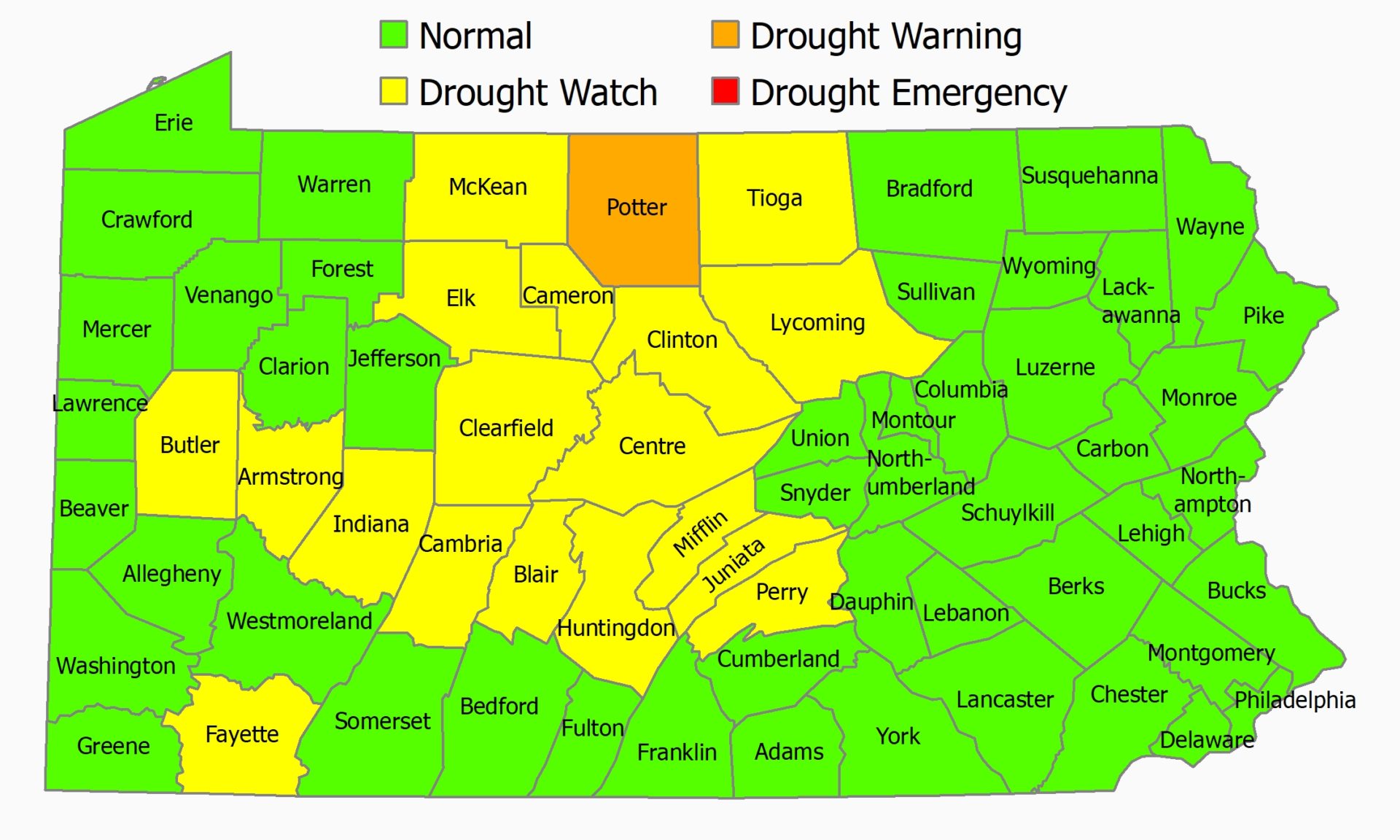Harrisburg, PA – After a meeting of the Commonwealth Drought Task Force, the Department of Environmental Protection (DEP) today moved Potter County to drought warning status and added three counties — Elk, Lycoming, and Tioga — to drought watch. There are now 18 counties on drought watch: Armstrong, Blair, Butler, Cambria, Cameron, Centre, Clearfield, Clinton, Elk, Fayette, Huntingdon, Indiana, Juniata, Lycoming, McKean, Mifflin, Perry, and Tioga.
Residents on drought watch are asked to reduce their individual water use 5-10 percent, based on a statewide average of 62 gallons per person per day. This means a reduction of three to six gallons of water per day.
Potter County residents are asked to reduce their individual water use 10-15 percent, or by six to nine gallons a day.
“We’re asking residents in these counties to use water wisely and follow simple water conservation tips to ease the demand for water,” said DEP Secretary Patrick McDonnell.
There are many ways to reduce water use around the house and yard, including:
- Run water only when necessary. Don’t let the faucet run while brushing your teeth or shaving. Shorten the time you let the water run to warm up before showering. Use a bucket to catch the water and reuse it to water your plants.
- Run the dishwasher and washing machine only with full loads.
- When watering your garden, be efficient and effective: Water in the evening or morning, and direct the water to the ground at the base of the plant, so you don’t waste water through evaporation.
- If you water your lawn, water it only when necessary, and avoid watering on windy and hot days. Apply no more than 1 inch of water per week (use an empty can to determine how long it takes to water 1 inch). This pattern will encourage more healthy, deep grass roots. Over-watering is wasteful, encourages fungal growth and disease, and results in shallow, compacted root systems that are more susceptible to drought.
- Re-use old water from bird baths, vases, or pet bowls to water plants.
- When mowing your lawn, set the blades to 2-3 inches high. Longer grass shades the soil, improving moisture retention. It also grows thicker and develops a deeper root system, so it can better survive drought.
- Check for household leaks. For example, a leaking toilet can waste up to 200 gallons of water daily.
- Sweep your sidewalk, deck, or driveway, rather than hosing it off.
- Replace older appliances with high-efficiency, front-loading models that use about 30 percent less water and 40-50 percent less energy.
- Install low-flow plumbing fixtures and aerators on faucets.
DEP is notifying all water suppliers in these counties of the need to monitor their supplies and be prepared by updating their drought contingency plans as necessary. Varying localized conditions may lead water suppliers or municipalities to ask residents for more stringent conservation actions by residents. Sixteen water suppliers in these counties have begun asking or requiring residents to reduce their water use.
DEP makes drought watch, warning, or emergency declaration recommendations based on four numeric indicators. The agency gets stream flow and groundwater level data from a statewide network of gauges maintained by the U.S. Geological Survey. In addition, DEP monitors precipitation and soil moisture. DEP also factors in information it receives from public water suppliers.
There are normal ranges for all four indicators, and DEP makes its drought declaration recommendations after assessing the departures from these normal ranges for all indicators for periods of 3-12 months. Declarations are not based on one indicator alone. For details on indicator monitoring, see this fact sheet: Drought Management in Pennsylvania.
DEP shares these data and its recommendations with other state and federal agency personnel who make up the Commonwealth Drought Task Force. Drought watch and warning declarations are determined by DEP, with the concurrence of the task force. Drought emergency declarations follow the same process, with final approval by the Governor.
A drought emergency has not been declared for any county.
Find more information at www.dep.pa.gov/drought.


